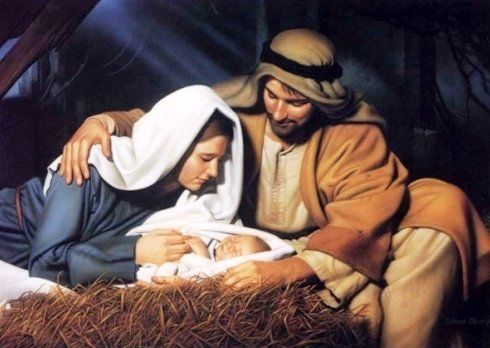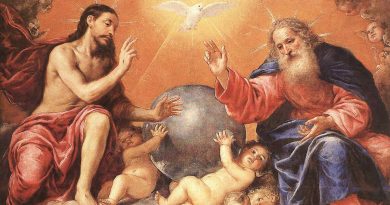The Family according to Pope Saint John Paul II
During the troubling year 2020, which is leaving us, dominated as it was from the coronavirus pandemic, we have also celebrated the first centenary from the birth of Pope Saint John Paul II, also known in history as Pope John Paul the Great. Today, we are also celebrating the Feast of the Holy Family of Jesus, Mary and Joseph.
Certainly our families have alot to learn from the Holy Family. In his Angelus address of Sunday 31 December 1995, the Feast of the Holy Family, Pope St John Paul II exhorted us: “Let us look to the Holy Family of Nazareth as an example for all Christian and human families. It radiates genuine love and charity, not only creating an eloquent example for all families, but also offering the guarantee that such love can be achieved in every family unit” (no.3). Then, the Polish Pontiff addressed the engaged and married couples and told them: “May those who are engaged to be married be inspired by the Holy Family in their preparation for matrimony; may spouses look to it as they build their domestic community. May faith grow and may love, harmony, solidarity, mutual respect and openness to life reign in every home”.
Already from this brief paragraph, taken from his immense magisterial teaching on the family, it suffices to justify that famous comment which Pope Francis made on his holy predecessor at his canonization ceremony that took place on 27 April 2014, the Second Sunday of Easter (Divine Mercy Sunday): “In his own service to the People of God, Saint John Paul II was the pope of the family. He himself once said that he wanted to be remembered as the pope of the family”. Let us appreciate some key reflections lovingly presented to the Church as well as to people of good will regarding the family according to Saint John Paul II.
The family is the hub wherein spouses live faithfully their sacramental bond. In his apostolic exhortation on the Christian family in the modern world, Familiaris Consortio, of November 22, 1981, the Polish Pope writes: “Spouses are therefore the permanent reminder to the Church of what happened on the Cross; they are for one another and for the children witnesses to the salvation in which the sacrament makes them sharers” (Familiaris Consortio, no. 13).
Christian marriage is a powerful liturgical means of santification. In Familiaris Consortio the Pope says: “Christian marriage, like the other sacraments, ‘whose purpose is to sanctify people, to build up the body of Christ, and finally, to give worship to God,’ is in itself a liturgical action glorifying God in Jesus Christ and in the Church” (Familiaris Consortio, no.56).
The goal of this community of persons, which is the family, is mainly love. In Familiaris Consortio he teaches: “The family, which is founded and given life by love, in a community of persons: of husband and wife, of parents and children, of relatives…with love the family is not a community of persons and, in the same way, without love the family cannot love, grow and perfect itself as a community of persons” (Familiaris Consortio, no. 18). And love demands love not abuse. In his worldwide known book written in 1960, Love and Responsibility, he affirms: “A person’s rightful due is to be treated as an object of love, not as an object for use”.
Joy in the family is every member’s job. In other words, all family members are co-responsible for their joy through serving. Pope Saint John Paul II accentuates this in the homily he delivered at the Capital Mall in Washington DC on October 7, 1979: “To maintain a joyful family requires much from both the parents and the children. Each member of the family has to become, in a special way, the servant of the others.”
For Pope Wojtyła marriage is a mutual gift that unifies and consolidates the married couple, thus making them a domestic church. In his book Love and Responsibility he reflects: “Marriage is an act of will that signifies and involves a mutual gift, which unites the spouses and binds them to their eventual souls, with whom they make up a sole family – a domestic church.”
Each family is to find its bedrock in letting Christ love its members and the latter love him in return. In address during visit to the tomb of Saint John Neumann, October 4, 1979 the Pope said: “What really matters in life is that we are loved by Christ and that we love Him in return. In comparison to the love of Jesus, everything else is secondary. And, without the love of Jesus, everything is useless.”
The importance of the family is so big that as the family fares so the national and international society fares. In his homily in Perth, Australia, on November 30, 1986, the Holy Father pointed out: “As the family goes, so goes the nation and so goes the whole world in which we live.” Love does not fall from the sky. It has to be built, slowly slowly with sacrifices and self-denial. In his book Love and Responsibility Pope Saint John Paul II writes: “Love between man and woman cannot be built without sacrifices and self-denial.”
Family shows us that life is a priceless treasure to be utilised with the utmost care. In his encyclical on the value and inviolability of human life, Evangelium Vitae, of 25 March 1995, Pope Saint John Paul II said: “Life is entrusted to man as a treasure which must not be squandered, as a talent which must be used well” (Evangelium Vitae, no. 52).
Egoism is the archenemy of family life. In his homily at the Capital Mall, Washington, DC, October 7, 1979, the Polish Pontiff said: “The great danger for family life, in the midst of any society whose idols are pleasure, comfort and independence, lies in the fact that people close their hearts and become selfish.” But when one opens one’s heart to love it is there that he and she attracts others to love him and her back. In his message to the young people of Cuba, on January 12, 1998, Saint John Paul II told them: “Genuine love … is demanding. But its beauty lies precisely in the demands it makes. Only those able to make demands on themselves in the name of love can then demand love from others”.
Given that these reflections on the family, by Pope Saint John Paul II, do much good to our families, why not each family examines itself through them from time to time?
Fr Mario Attard OFM Cap





